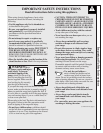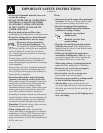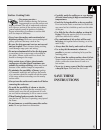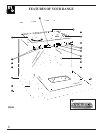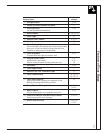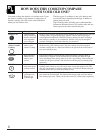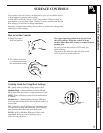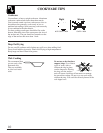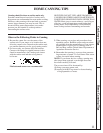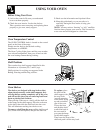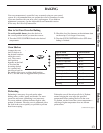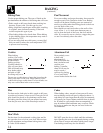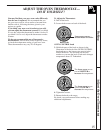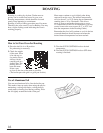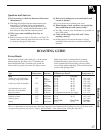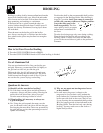
11
Cookware Tips Home Canning Tips
HOME CANNING TIPS
Canning should be done on surface units only.
Pots that extend beyond one inch of surface unit’s
drip pan are not recommended for most surface cooking.
However, when canning with water-bath or pressure
canner, larger-diameter pots may be used. This is
because boiling water temperatures (even under
pressure) are not harmful to cooktop surfaces
surrounding the surface units.
HOWEVER, DO NOT USE LARGE DIAMETER
CANNERS OR OTHER LARGE DIAMETER POTS
FOR FRYING OR BOILING FOODS OTHER THAN
WATER. Most syrup or sauce mixtures—and all types
of frying—cook at temperatures much higher than
boiling water. Such temperatures could eventually
harm cooktop surfaces surrounding surface units.
Observe the Following Points in Canning
1. Be sure the canner fits over the center of the
surface unit. If your range or its location does not
allow the canner to be centered on the surface unit,
use smaller diameter pots for good canning results.
2. For best results, use canners with flat bottoms.
Canners with flanged or rippled bottoms (often
found in enamelware) don’t make good contact
with the surface unit and take a long time to
boil water.
Flat-bottomed canners are recommended.
3. When canning, use recipes and procedures from
reputable sources. Reliable recipes and procedures
are available from the manufacturer of your canner;
manufacturers of glass jars for canning, such as
Ball and Kerr; and the United States Department of
Agriculture Extension Service.
4. Remember that canning is a process that generates
large amounts of steam. To avoid burns from steam
or heat, be careful when canning.
NOTE: If your house has low voltage, canning may
take longer than expected, even though directions
have been carefully followed.
The process time will be shortened by:
(1) using a pressure canner, and
(2) starting with HOT tap water for fastest heating
of large quantities of water.



